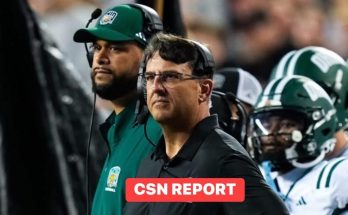Former Cleveland Cavaliers forward Marcus Morris Sr. has found himself at the center of a troubling legal saga, as news broke that he has been arrested in Florida and is currently being held without bond. The arrest stems from allegations that Morris wrote a bad check, a situation that has not only raised eyebrows around the NBA but also cast a shadow over his off-court reputation. The incident, which unfolded quietly until it reached the public domain, paints a sobering picture of the challenges even seasoned professional athletes can face once they step away from the spotlight—or when they are no longer under the protective umbrella of a major franchise.
Marcus Morris Sr., a veteran forward known for his gritty playing style and tenacity on the court, has long been regarded as one of the more rugged and vocal players in the league. Drafted in 2011 by the Houston Rockets, Morris has played for several teams including the Phoenix Suns, Detroit Pistons, Boston Celtics, New York Knicks, Los Angeles Clippers, and most recently, the Cleveland Cavaliers. Over the years, he carved out a role as a tough, defensive-minded forward who could hit clutch threes and provide veteran leadership in high-pressure moments. But despite the respect he commanded in locker rooms across the league, his recent off-court troubles have brought a different kind of attention—one that no athlete welcomes.
According to law enforcement officials in Florida, Morris was taken into custody earlier this week following the issuance of a warrant for his arrest. The warrant was reportedly related to a financial dispute involving a check he allegedly wrote that was later deemed insufficient due to a lack of funds in the account. Such incidents, while not uncommon in the broader scope of financial crime, are particularly glaring when they involve a former professional athlete who, by all appearances, had earned millions over the course of a lengthy NBA career. The details surrounding the exact amount of the check and to whom it was written have yet to be fully disclosed, but reports confirm that Morris is being held without bond as the case undergoes further legal review.
The arrest has triggered a wave of speculation and concern within basketball circles, particularly among fans and analysts who had followed Morris’ career through its highs and lows. Some have questioned how a player who reportedly earned over $90 million in salary alone during his time in the NBA could find himself in such a predicament. Others have pointed to the potential complexities of managing wealth post-retirement or after exiting the league. While Morris has not officially retired from professional basketball, he remains a free agent and has not been affiliated with any team since his brief stint with the Cavaliers.
Beyond the financial questions, the legal consequences of Morris’ actions are now front and center. In the state of Florida, writing a bad check—especially one exceeding a certain amount—can be classified as a felony, particularly if it is determined that the act was committed with fraudulent intent. If convicted, Morris could face not only fines and restitution requirements but also potential jail time. The fact that he is currently being held without bond suggests that authorities may view the case as serious or perhaps worry that Morris might be a flight risk. It is also possible that there are other legal complications involved, though those details remain closely guarded at this stage of the investigation.
This isn’t the first time Marcus Morris has been involved in a legal issue, though nothing in his past suggested a history of financial misconduct. In 2017, both Marcus and his twin brother Markieff Morris were acquitted of aggravated assault charges stemming from an incident in Phoenix, Arizona, in which the two were accused of participating in a group attack. The trial ended in their favor, and both brothers continued their NBA careers without significant interruption. However, the latest arrest in Florida introduces a far more personal and potentially damaging chapter in Marcus Morris’ life, one that cannot be dismissed as merely a misunderstanding without due legal process.



